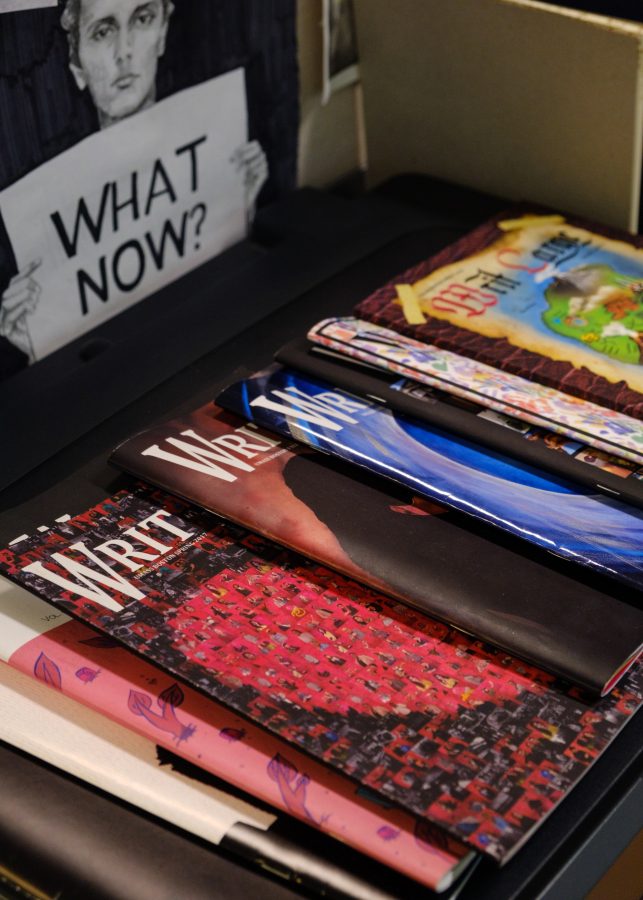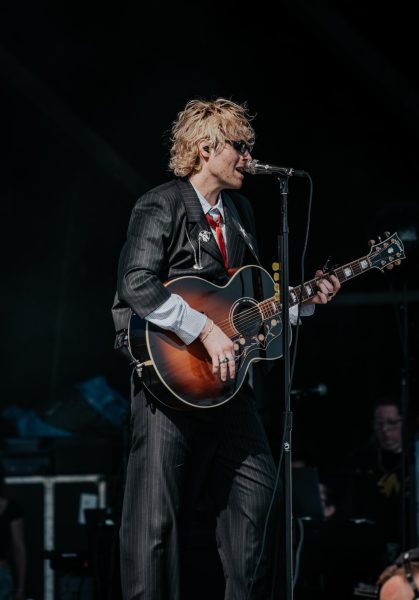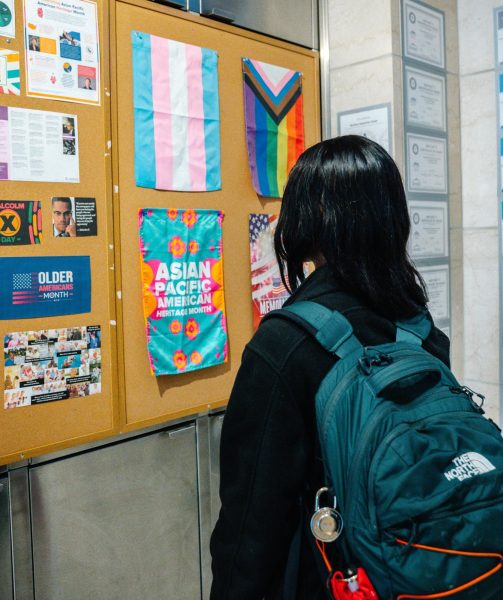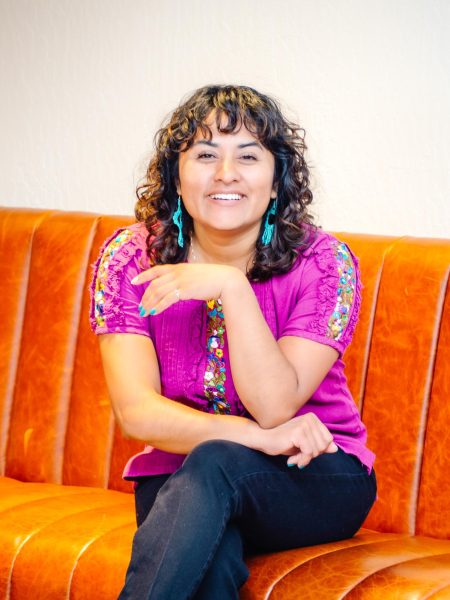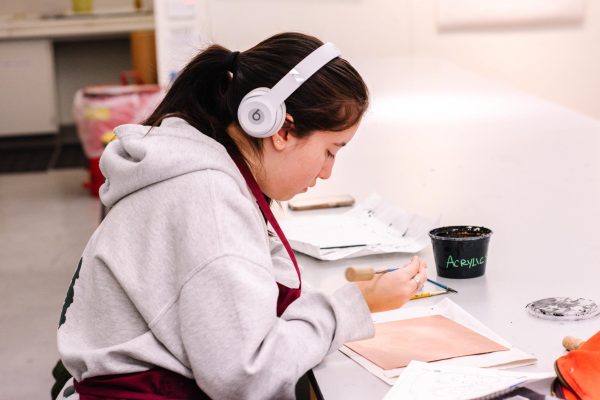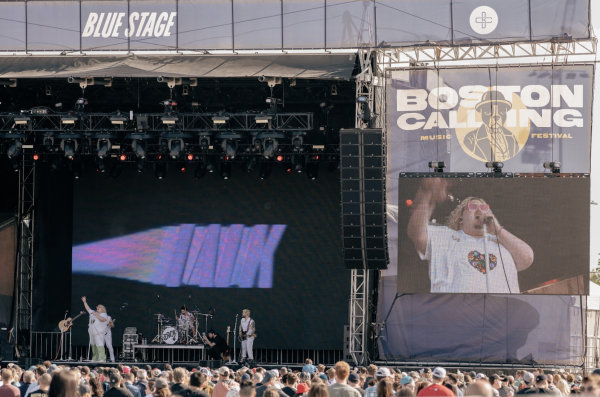Writ Large’s “Millennial Map”—modern voices in a sea of modern issues
Past covers of the Writ Large. Photo by Josh Kotler / Mass Media Staff
October 15, 2021
This overview contains minor spoilers for the spring 2020 edition of Writ Large.
In a modern world filled with endless social media services, climate change and basic human rights always on the line, day-to-day life can feel overwhelming to most young people. Most days, simply getting up and going to class or work can seem like a daunting task, much less being present and retaining the information learned each day. UMass Boston’s literary magazine, Writ Large, perfectly captures all of these anxieties felt by the younger generations in their newest edition, “The Millennial Map”, paired with beautiful art and amazing writing along the way.
Writ Large is UMass Boston’s nonfiction literary magazine that features academically researched op-eds—short for “opposite the editorials page” or “opinions and editorials page”—from UMass Boston students biannually. Each edition has a core theme, such as “The Year 2020”, “Handprints and Footprints” or “We the People”, and writers can write whatever they want based on that theme, so long as it is approved by the editing staff and has plenty of research to back it up. Many of the Mass Media’s writers and production members, past and present, can be found on the team for Writ Large as well.
“The Millennial Map”, spring 2020’s edition of Writ Large, focuses on the unique and chaotic experiences of being in the younger generations. Though the line is blurry on whether these younger generations—especially the current young adults in college—fall into the Millennial generation, Generation Z, or both, experiences like climate change, racism, student loan debt and the world of online dating and hookup culture have been universal with both generations.
Though I loved the entire edition and thought all of the pieces and their authors made incredibly interesting and thoughtful points, I did have a few stand-out pieces. “Drowning in an Unusual Diagnosis” by Rose Murray grabbed my attention right out of the gate, as Murray described being diagnosed with a rare disease that made them allergic to the cold. Murray details how they were essentially fine one day, and the next they broke out in hives after getting an iced coffee. The way Murray described their feelings of distraught and loneliness helped me connect with the piece, and though I had heard about this rare disease, this helped connect a person to the diagnosis and make it real.
Meghan Connolly’s “The Path of Motherhood” was also an interesting article that I found a lot of connection in. Connolly focuses their piece on motherhood—that is, motherhood that comes from giving birth to a child of your own blood—being the expected path for women, even if that isn’t what women can afford to do, want for themselves or are physically capable of doing. I do not see myself ever having children of my own, and I found myself relating to a lot of what Connolly wrote in their piece—especially the line about not being void of maternal instinct and the way it just manifests itself in ways other than with children. Though I never grew up in a family where motherhood was heavily pushed upon me, I could definitely relate to the subtle influences urging me down that path.
As someone who grew up around food and cooking, “The Millennial Undervaluing of Cooking” by Kelsey Vale stuck with me. Vale describes how little the younger generations value the art of cooking and preparing food, and instead turn to delivery apps and fast food. This isn’t solely the fault of the younger generations, though, as Vale points out. Many people, young people especially, simply don’t have time to learn to cook the way our parents and grandparents may have. However, the way Vale describes cooking as a form of therapy and relaxation connected with me, considering I have become known for baking in times of stress and sharing it amongst friends and family members. The tenderness and love Vale puts into describing their passion for cooking was something I could relate to as well, since much of their love came from cooking with their grandparents, as did mine.
Finally, “Between Commodities and Rights” by Abdullah Almohammad was a stand-out for me. Almohammand discusses how basic human rights, such as health care and education, have become commodities, and how only the upper classes can afford to have the best of both. This piece particularly struck a chord with me because I am currently taking an Intro to Human Rights class. In this class, we have discussions about how simply because these are claimed as basic human rights that every person is entitled to, it doesn’t mean that every person actually has access to them. Education and health care have been popular in our discussions as well, so reading this piece, which stated plainly that a lack of good education and health care harms society as a whole, helped cement my learnings in class.
The spring 2020 edition of Writ Large, “The Millennial Map”, is now available to read in print or on Writ Large’s website, writlargemag.org. Information about contributing to the fall 2021 edition, “American Obsessions”, can also be found on their website.





















































